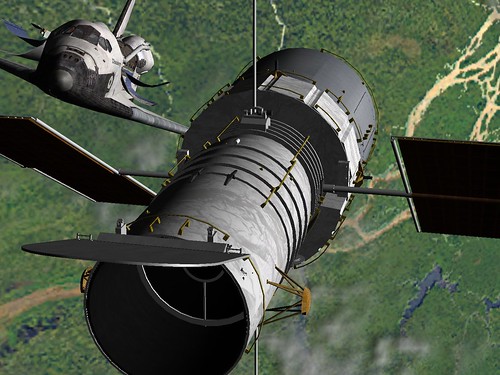
Last week, Fraser Cain of Universe Today (who also organizes the Carnival of Space) sent out a call to space bloggers for brief comments on why we should spend money on space exploration “when there are so many problems here on Earth.” He gathered the responses into a very nice blog post. I was busy and traveling and didn’t have time to submit something. My past comments on this subject suggest that I would have had trouble with the “brief” part anyway.
Having read the original posts and some of the comments, I decided to write a sort of “meta post” and look at this whole thing from a level up. It seems that the pro’s included various “it’s what we do” arguments (inspiration, sense of wonder, scientific curiosity, the need for a challenge, the human drive to explore, it’s the modern version of building a cathedral, etc.), several “backup plan” arguments (what if something destroys the Earth, we want to avoid the dinosaurs’ fate, create colonies, etc.), various economic arguments (stimulate science and technology, generate technology spin-offs, generate high tech jobs, generate solar power in space, exploit valuable lunar or asteroid materials, etc.), and education, which I think overlaps several of those categories. Probably there are some others too, like contributing to world peace through international cooperation in space, and several who said “we have enough wealth and brains to explore space and solve problems on Earth.” I agree with most of these!
On the negative side, some people say things like “why should my tax dollars pay for your inspiration?” and “let people in the future worry about asteroids, we have enough problems now” and “there’s no way it will ever be economic to do that” (mine the Moon, build solar power satellites, etc.). They also say things like “if you want widgets, develop widgets, don’t build rockets and hope widgets get developed along the way” and “we should inspire our kids to save the Earth and take care of people, not go to space.”
There are a lot of good points here on both sides of the issue. It’s clear that telling someone that NASA’s budget is “only” 0.6% of the federal budget doesn’t hold much weight if that person doesn’t care about space (it’s still 17 billion bucks). People who are inspired by football or Impressionism may not buy the space cathedral argument.
It’s also not really a single question or issue. If you ask “why should the US government spend money on NASA to do this or that,” you narrow it down for Americans, but Americans are not the only ones exploring space (though NASA’s budget is the biggest government space budget). There’s human vs. robot exploration (plus combined approaches). There are other countries and there are private space technology developers too. Space is there, and it’s been shown to be valuable technically, economically, and politically at various levels, so space will continue to be exploited and explored by someone, sometime. These are really questions about priorities more than anything else.
It may not sound very passionate or original, but I think the answer can be summed up in a few well-worn clichés. Things like “all things in moderation,” “don’t put all your eggs in one basket,” “listen to both sides of the story,” “if at first you don’t succeed, try again,” “never say never,” and “don’t stop thinking about tomorrow” (OK, that’s a song lyric). I really think that a diversity of goals and approaches, cooperation and competition, plus economic self-interest will ultimately get us there in space (wherever “there” is), and if some things happen a few years later than I would like, it’s not the end of the world (usually). Is this too Pollyannaish, “everything will just work out?” Maybe so, but there are a lot of interested parties and a lot of good things happening already, and as long as you don’t impose the constraint that “America must dominate in space,” I think amazing things will happen in space over the next 10 to 20 years.
As for NASA, I do wish that they could figure out how to do a better job on educating the public about what they do (so much of it is awesome), and I wish they would allocate just a bit more money to new private space development. There is also one thing that everybody should remember: all the money ever spent “on space” was really spent here on Earth, for salaries, education, technology, many things, and yes, this money has also bought us a lot of inspiration in addition to many practical benefits.
No comments:
Post a Comment